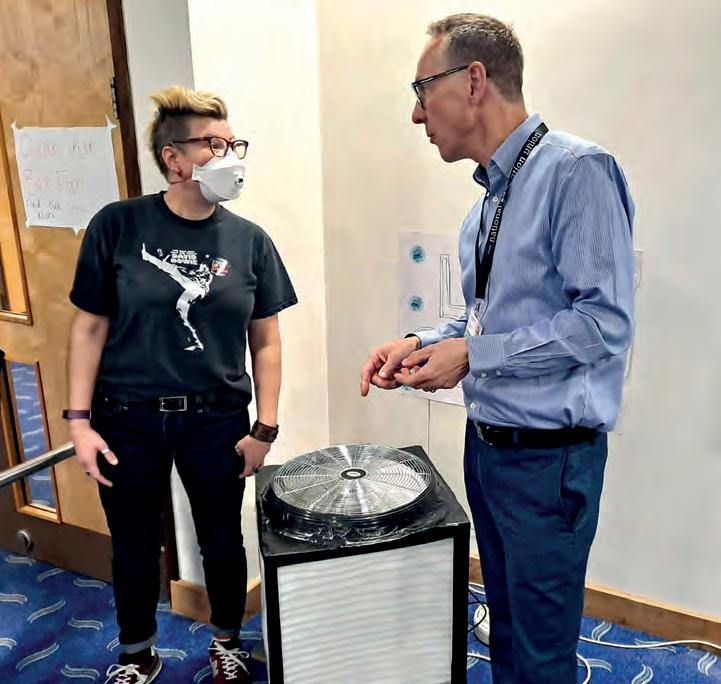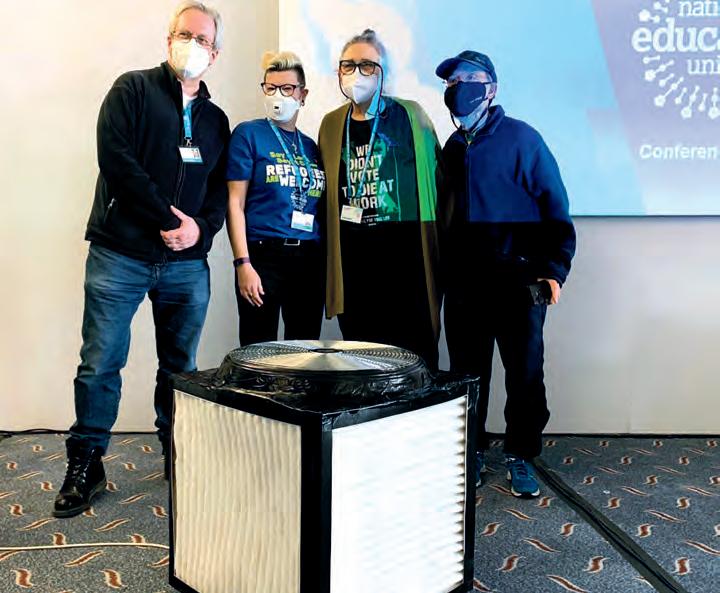
4 minute read
Feature
Inside the magic box
A low-cost, DIY air filter that removes viruses and allergens from classrooms could have huge health benefits for staff and students, and improve pupil concentration. Sally Gillen finds out more.
AIR quality in classrooms has been in the spotlight as part of measures to reduce the spread of Covid-19 in schools. As the virus continues to cause high rates of staff and pupil absence – and chaos for leaders – some schools have been investing in air filters educators can build themselves.
The Corsi-Rosenthal filter (CR), invented in the US and used with great success in schools, has now been adapted by Welsh consultant Dr Rhys Thomas at Glangwili Hospital in Carmarthen. He worked with pupils at the Ysgol Bro Pedr on building his Corsi Rosenthal Thomas box. In March, Ceredigion Council announced that it will fund components for the box filters in schools, which the children will build.
Hilda Palmer at Hazards Campaign has delivered training for the NEU on ventilation in classrooms throughout the pandemic. She describes the CR box as “a bit of magic”.
NEU rep Jess Dunn tells secondary head Robin Bevan more about Spinney, the Corsi Rosenthal filter she built for £150 Simplicity works Its design is simple. Four filters, a cardboard bottom and a fan on the top. “Air circulation in classrooms is often very poor. Better ventilation and HEPA filtration will not only remove Covid but all flu viruses, allergens and pollen that cause hay fever and asthma and particulate pollution, so it could have a huge effect on the health and wellbeing of children,” says Hilda. “Research shows that if you can reduce the carbon dioxide level and improve ventilation, it improves children’s attainment, concentration, cognition and test scores. It also reduces staff and pupil sickness absence.”
With demand for HEPA filters hugely outstripping the Department for Education’s supply – and many schools finding them too costly to purchase themselves – the CR box is a low-cost alternative, says Hilda.
A US study published in the Science of the Total Environment journal concluded the performance of DIY models, such as the Corsi-Rosenthal, compared favourably with three commercial HEPA filters on clean air delivery rate and noise and were five to ten times cheaper. Its four components can be purchased for between £100 to £150 and the box costs 7p a day to run over a school day of five hours.
Hilda and her 12-year-old grandson made a box filter in under ten minutes,

L-R: Barnet NEU district secretary Keith Nason, Barnet NEU rep Jess Dunn, Hilda Palmer from Hazards Campaign and Barnet Council equalities officer Bahir Laatoe show box filter Spinney at the NEU annual conference
FIND OUT MORE
For safety at work
Hazards Campaign is a UK-wide network of resource centres and campaigners hazardscampaign.org.uk. For more information tinyurl.com/ bdzc9fk5
For CR box advice
To compare the price, performance and efficiency of the CR box components, go to fullplasticscientist.co.uk
To learn more
Jess Dunn has a package of information on CR boxes including a risk assessment that she can share, at crboxneu@ gmail.com
How to build a Corsi-Rosenthal Thomas box
www.youtube.com/ watch?v=l4uCRuO-Ayo&t=4s
with parts sourced on the internet for £125, she says. In April, she joined NEU rep Jess Dunn (pictured) at a packed fringe session at the NEU’s annual conference in Bournemouth where the box generated significant interest among members including former NEU president and secondary head Robin Bevan.
Go forward with caution For leaders interested in commercial HEPA filters, Hilda has a note of caution. “Because this whole area isn’t well-regulated, there are a lot of snakeoil salesman out there, claiming all sorts of amazing results for products that have not been tested independently. So watch out for that. The websites fullplasticscientist.co.uk and cleanairstars.com/filters may be useful. Also, filtration doesn’t replace ventilation. You need to have clean air coming in, bringing in more oxygen, taking the carbon dioxide away. It is important head teachers don’t think a room is fine if it has no ventilation but has a filter. If you don’t have masks in class, you need filtration even more.”
The noise produced by the fan is also an important consideration. Too loud and it will disrupt teaching and learning. Hilda advises purchasing one which operates at under 50 decibels. It is also key to know the clean air delivery rate of your box filter. To be effective, you need six changes of air every hour.
An important investment With budgets tight, investing in filters may seem unnecessary when the pandemic may soon be over, says Hilda, but, with one in four schools located in a heavily polluted area, she stresses that ensuring the air in classrooms is clean is important generally. “Some head teachers bought filters months ago and found they are having an incredible effect,” she says. There are examples of teachers turning off filters and saying they aren’t needed because there is no Covid in the school. “Of course they don’t have any Covid, because they have the filters,” laughs Hilda. “They are a victim of their own success”. Beyond the pandemic, she says: “It’s important that unions tackle this issue and, since we have been abandoned by the Government, we also all need to take more control and empower ourselves to do something about the filthy air we’re working in.”







